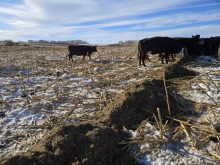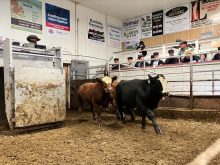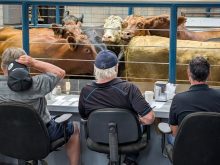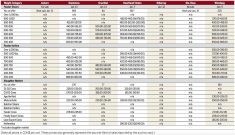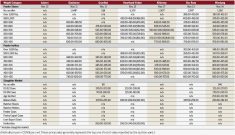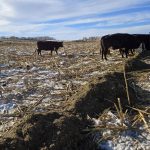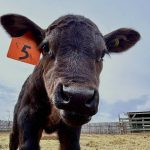“I know my friends in the hog industry don’t agree with me.”
– GARY DOER
He reduced education taxes on farmland. He doubled agriculture spending during his 10 years in office.
But many Manitoba farmers will remember Premier Gary Doer for one thing: Bill 17.
The famous (or infamous) bill, passed exactly one year ago, banned new and expanded hog operations in the heart of Manitoba’s livestock alley, where two-thirds of the province’s pigs are born.
Read Also

Tie vote derails canola tariff compensation resolution at MCGA
Manitoba Canola Growers Association members were split on whether to push Ottawa for compensation for losses due to Chinese tariffs.
And if Doer, who leaves provincial politics this fall, is looking for an agricultural legacy, many producers, fairly or unfairly, feel Bill 17 is it.
Granted, the hog moratorium is a bit moot right now. Almost no one in the financially battered hog industry is building new barns anyway.
But bitterness among producers still lingers.
“This was a major part of my farming operation. I always tried to balance things off between the grain side of my operation and the hog side of my operation. And I was nowhere near finished building barns in my life. I had fully expected to build another three or four barns before I retired,” said Rolf Penner, a hog and grain farmer near Morris.
“I’m a young guy and if my kids were to follow, I would have hoped that would have been in their future, too. And as long as there’s a moratorium, I can’t do that.”
NO COMMENT
The Manitoba Pork Council, which lobbied fiercely against Bill 17, refused to comment on Doer’s leaving office. “I still have to work with this government,” was all Karl Kynoch, council chairman, would say.
Martin Unrau, a former Manitoba Cattle Producers Association president, said he was “a little disappointed” at Doer’s agricultural record, especially on environmental regulations.
“I believe he brought environmental regulations forward before he looked at the science on many issues, especially for the cattle industry,” said Unrau, a producer from MacGregor.
Others, however, take a more generous view of Doer’s impact on Manitoba’s agriculture sector during his government’s 10 years in power.
MANAGEMENT FOCUS
Ian Wishart, Keystone Agricultural Producers president, said nutrient management initiatives implemented by the Doer administration helped make Manitoba farmers more environmentally conscious, particularly about water quality.
“The focus on how we manage nutrients on the farm has actually been good for our bottom line on many occasions.”
As for Bill 17, Wishart said Doer may have felt pressured by environmental forces within both his caucus and the NDP party which wanted even tougher action on hog expansions. “I think he was driven to take a more extreme action than frankly he wanted to.”
Ed Tyrchniewicz, a University of Manitoba senior scholar, agreed Bill 17 was “not one of (Doer’s) finer moments,” since a Clean Environmental Commission report on hog industry sustainability did not recommend a moratorium.
COULD HAVE BEEN WORSE
But Tyrchniewicz said the outcome could have been worse if Doer’s caucus, dominated by urban, northern and labour interests, had had its way.
“I think he was the one who had to bring pragmatism to it. Otherwise, there would have been those who probably would have made sure we shut down every farm in the province.”
Tyrchniewicz noted Doer played a central role in launching the Richardson Centre for Funct ional Foods and Nutraceuticals to advance agrifood research in Manitoba.
The Food Development Centre in Portage la Prairie also expanded under Doer’s watch.
In an interview with the Co-operator, Doer expressed disappointment at not expanding beef processing in Manitoba, as happened with hogs and potatoes.
MIDDLE GROUND
But he offered no apologies for the hog moratorium, calling it a middle way between uncontrolled development and a province-wide ban on all expansion.
“I know my friends in the hog industry don’t agree with me and I respect their right in a democracy to fight for their industry,” said Doer. “(But) I think it’s right and I’ve talked informally to agriculture experts and they quite frankly think it was the right way to go.”
Doer ranked his government’s gradual reduction of education taxes on farmland high on the list of producer benefits.
He pointed out Manitoba’s agriculture budget rose from $113 million in 1999 to $226 million in 2009. Agriculture overspends its annual budget more often than any other department because program payments increase when farmers’ financial margins decline, he said.
RURAL RECORD
Doer rejected frequently heard complaints that the NDP is predominantly an urban-based party with limited concern for issues outside Winnipeg.
“If we were a party of the city, we wouldn’t have removed education tax on farmland.”
He also noted the NDP government in November 2001 implemented a uni form rate structure for hydroelectric power. Previously, rural and northern communities paid higher hydro rates than Winnipeg did because of their lower population densities.
One thing agriculture has done for Doer is to make him pay closer attention to the weather, despite teasing from his wife Ginny.
“I get up in the morning and look at the weather forecast just like every farmer in Manitoba.”
Doer announced August 27 he would step down as premier. The following day, Prime Minister Stephen Harper named Doer as Canada’s next ambassador to the United States.
Doer will stay on until his successor is named. An NDP leadership convention will be held October 17. [email protected]


